
 |
| 1. THE INDONESIAN ELECTIONS | ||||||
| In mid May, Asia Pacific Report editor, Frank Mount, attended a conference on the presidential elections in Jakarta which a number of the presidential candidates addressed. This conference was jointly sponsored by the Centre for Strategic and International Studies (CSIS) in Jakarta and The Asia Pacific School of Economics and Government (APSEG) at the Australian National University (see pictorial report below). Mount found the Indonesians to be upbeat about their recent, April general elections, which had gone off remarkably well, and excited about their coming presidential elections when for the first time in history every Indonesian voter will have an equal say in directly electing who will lead the country. While former general and cabinet minister, Susilo Bambang Yudhoyono was way ahead in the polls, Mount was surprised to find that, with some notable exceptions, the general consensus of the conference was that the three leading candidates, Yudhoyono, the incumbent President Megawati Soekarnoputri and former general Wiranto were running neck and neck in a complex race (see Comment below). Since then, Yudhoyono has remained well ahead in the opinion polls with about 40% followed by Megawati with about 11% and Wiranto with something between 5 and 10%, depending on the day of the poll. The other two were lagging with less than 5%. | ||||||
| The first round of the presidential elections takes place on 5th July. If no one presidential/vice-presidential team wins more than 50% of the national vote and 20% in the provinces, there will be a run off between the top two on20th September. | ||||||
| There are five competing Presidential/Vice-Presidential teams. They are: | ||||||
| 1. Megawati-Muzadi | ||||||
| Megawati has the advantage of being the incumbent president. She can announce and implement various policies and programmes to help her cause and is already doing that. Her party, the PDI-P won 109 seats in the DPR. She and her party are secular nationalist. Her vice presidential running mate, Hasyim Muzadi is the chairman of Nahdlatul Ulama (NU), the largest Islamic organisation in the country with over 40 million adherents. Muzadi is a competent politician who could pull a significant amount of support from kiai in Java. The anti-militarism factor might also favour this team as the two other leading teams are led by military men. | ||||||
| 2. Wiranto and Solahuddin Wahid | ||||||
| ||||||
| Human rights record | It has been said of Wiranto that he had "de facto or effective control" of the militias that reeked havoc in East Timor in 1998-99 and "control" of the soldiers who conducted a "scorched earth" campaign on it in 1999 (see for example Sian Powell, The Australian, 17th May, 2004). Despite his position as Indonesian Military (TNI) Commander, none of this was really true. As we have explained many times before, the TNI over the years has been comprised, for the want of a better term, of many more or less independent military/business/political 'fiefdoms' variously on national, regional and local levels. The idea of some uniform, national to 'village' command structure has been nonsense. The TNI was therefore an organisation of informal networks, some of them weaving through the ranks from near the top to the bottom. So, in East Timor's case (and we could say the same thing about other places like Sulawesi) the militias were, generally speaking, run and financed by essentially locally based TNI officers, local East Timorese political bosses and Indonesian and foreign businessmen with a stake in East Timor, as well as other TNI officers, some of them retired, who were formerly based in or associated with the East Timor region and maintained a continuing business interest in it while living elsewhere. Some of them could even have been retired generals. (If we digged a bit more, we're sure we could complicate the picture even further, especially as civilian militias have long been an official part of Indonesian military and police 'structures'.) The point being made here is that the East Timorese militias were acting outside of the control of the TNI command. | |||||
| Planned in Jakarta | As far as the "scorched earth" campaign conducted by the retreating TNI forces in mid 1999 is concerned, Western Intelligence services obtained a leaked document in February 1999 showing that this was planned in the Jakarta office of General Feisal Tanjung, then the Co-ordinating Minister of Politics and Security (Polkam) and Wiranto's predecessor as TNI commander. In other words, it was planned - and executed - outside of the military itself. Feisal ran around the military command through his own network to the forces in East Timor. Where Feisal was coming from might be seen in a clearer light if it is remembered that during the riots, burning and killings in May 1998, at the time of Soeharto's removal, he called on Muslims to rise up and destroy the largely Christian Chinese community. He had long been identified with the radical Muslims and had always been considered an enemy of the secular nationalist Wiranto. Another career- long enemy of Wiranto's (and Feisal's) who also had an iron in the fire in East Timor was the then Kostrad and former Koppassus and 'East Timor' region commander, General Prabowo Subianto, a son-in-law of Soeharto's. The governor of East Timor at the time, Abilio Soares, is one of the only persons so far convicted of human rights abuses in East Timor for his support of the militias and he was a Prabowo man - as were a number of serving and retired TNI officers there. Prabowo is said to have had a long history of setting up operations to embarrass Wiranto - including, perhaps, the 1991 Santa Cruz massacre in Dili. We have little doubt that Wiranto knew or had a very good idea that all of these things were happening. In our view, he should have sacked a number of TNI officers in East Timor and have ordered the TNI to stop supporting the militias. His reply to this, we understand, is that it would not have made any difference. That might be true, but he should still have done it. He didn't because he lacked the ticker, showing that he was something much less than the strong man portrayed in the Western media. (It should be noted here that the references to "rogue TNI elements" in East Timor at that time did not refer, as some commentators seem to think, to just junior officers and soldiers running out of control. It included both serving and retired senior officers and generals operating outside the official military structure, with, as mentioned above, some of them based in Jakarta - and elsewhere.) | |||||
| Trisakti | Wiranto has also been accused of being involved in, if not behind, the student killings at Trisakti University in 1998 shortly before Soeharto's overthrow. We happened to have been there at the time. The killings occurred as rioters rampaged through the city streets raping, and burning countless buildings, many of them Chinese owned, as they went. From the air, Jakarta looked like a WWII bombing site. Fortunately, some of our military and other sources were able to report to us in our hotel room every morning and evening and we were able to keep in touch with others on the streets through mobile telephones. Rightly or wrongly, the word was that most of the rioting was the work of radical Muslims while the Trisakti killings was blamed on forces close to Prabowo. Prabowo was and is an extremely intelligent and ambitious man and he was making a very serious play for power in 1998. Getting rid of Wiranto was a major objective. However, when a politically senile Soeharto returned from his ill-advised trip to Cairo in May 1998, Wiranto showed him evidence of Prabowo's involvement. Soeharto immediately sacked his son-in-law. (At the same time, Wiranto's recent claim that he could have seized power in 1998 when he took Soeharto's resignation is a nonsense. Apart from anything else, including a lack of military support, there were hundreds of thousands of pro-democracy activists on the streets of Java who would have torn him apart.) | |||||
| Very awkward | So for these sort of reasons, we believe Wiranto has been excessively maligned, especially as many other generals, including Yudhoyono, could be said to have had command responsibility at the time of serious human rights abuses in various parts of the archipelago from Aceh to West Papua. At the same time, we believe that it would be most unfortunate if he was elected president both for himself and the nation precisely because these human rights charges have been levelled at him both domestically and internationally. He would simply face one awkward situation after another wherever he went overseas. He would face demonstrations, and perhaps even arrest. (Indeed, he might even be forced to step down and hand over power to Wahid. That would indeed be ironic and we'd be surprised if Gus Dur hasn't thought about it. Unfortunately, if that ever happened, we'd just be back on the old merry-go-round again). | |||||
| 3. Susilo Bambang Yudhoyono and Jusuf Kalla | ||||||
| ||||||
| One difficulty for him - alluded to above - is that, like Wiranto, he is being questioned on the human rights issue. He was chief of staff of the Jakarta garrison on 27th July, 1996 when the military took over Megawati's PDI headquarters and a number of her supporters were killed and injured, some of them never to be seen again. It would appear that he had command responsibility. However, his supporters argue that he was not responsible and that the officers on the ground either acted on the own initiative or that of someone else, perhaps even Soeharto himself, running around or injecting themselves into the military structure. | ||||||
| Note: Yudhoyono and Kalla won the election, and profiles of all members of the 2004 Yudhoyono Cabinet were provided in Asia Pacific Report 65 | ||||||
| 4. Hamzah Haz and Agum Gumelar | ||||||
| Hamzah Haz is the incumbent vice president and is the chairman of the United Development Party (PPP) which is overwhelmingly Islamic in membership.The PPP obtained 58 seats in the new parliament. Hamzah is also a prominent member of Nahdlatul Ulama. More importantly, he is widely seen to be close to radical Muslims or Islamists, if not one himself. He has openly gone to the defence of people like Abu Bakar Bashir and organisations like Jemaah Islamiah. His running mate Agum Gumelar is another former general has been Minister for Communications in Megawati's cabinet. He is a highly intelligent man who has had other political opportunities without seizing them. He has always been regarded as a secular nationalist and rose through the military with Wiranto and Yudhoyono. | ||||||
| 5. Amien Rais and Siswono Yudhohusodo | ||||||
| Amien Rais is the leader of the National Mandate Party (PAN), was Speaker of the People's Consultative Assembly (MPR) and is a former chairman of the country's second largest Muslim organisation, Muhammadiyah which about 30 million adherents. PAN won 52 seats in the DPR. His running mate, Siswono, is a successful property businessman and is the chairman of the Indonesian Farmer's Brotherhood Union (HKTI). He was a minister for transmigration under Soeharto and would make a competent and acceptable vice president. Rais is charming and erudite. However he has problems. He has made numerous political mistakes and many people do not trust him on the Islamist issue. At the Jakarta conference mentioned above, he declared that the Koran made it clear that "no Muslim could be ruled by a non-Muslim". Whatever this means in practice and how extensively and in what circumstances it would be applied is unclear. Would it apply for example to civil servants? It is this sort of statement that leaves people feeling uneasy. | ||||||
| Fascinating contest | As we said earlier, this is a fascinating contest which has the whole nation almost transfixed. Part of the fascination lies in its seeming complexities and uncertainties. How far will the various vice president influence the first vote? How will the Golkar and NU votes divide up? What influence, if any, will the very fact of there being a run-off have on the first round? Are the polls showing Yudhoyono well ahead with 41% and growing accurate – in a country known for its unreliable polling? Can Mega pull it off against the two former generals? Was the conference right in saying that the top three were running neck and neck? And, if so, could this give one of the outsider teams a chance? Time will tell. In the meantime, Indonesia' government and bureaucracy has ground to a halt – and is likely to remain in that state until after the presidential election. | |||||
| 3. THE JAKARTA CONFERENCE - PICTORIAL FEATURE | ||||||
| A selection of photographs taken at the Jakarta conference The Indonesian Presidential Elections 2004: Up Close and Up to Date sponsored jointly by the Indonesian Centre for Strategic and International Studies (CSIS) and The Asia Pacific School of Economics and Government (APSEG), Australian National University and which was attended by APR Editor, Frank Mount. | ||||||
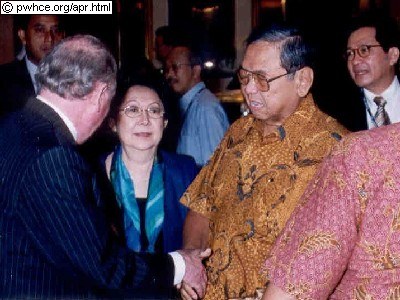 | 1. Frank Mount greets old friend Abdurrahman Wahid, former Indonesian President and chairman of Nadhlatul Ulama. Between them is Clara Joewann from CSIS and rear right is Hadi Soesastro, chief economist and CSIS Executive Director. | |
2. With presidential candidate former general Susilo Bambang Yudhoyono and a number of conference delegates, including former ambassador to Australia, Sabam Siagian in the foreground. | 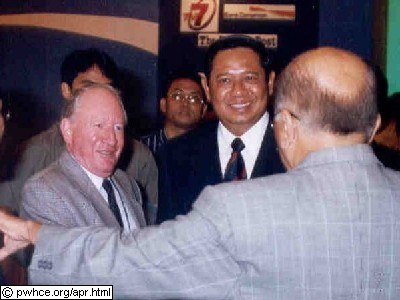 | |
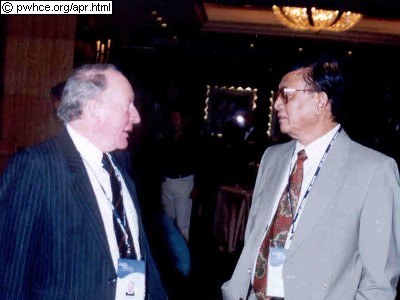 | 3. Discussing Aceh with Wiryono Sastrohandoyo, a former Indonesian ambassador to Australia and more recently the government's chief negotiator on Aceh. | |
4. With the Australian National University's Ross Garnaut and Jusuf Wanandi, co-founder and member of the board of trustees of the Centre for Strategic and International Studies (CSIS). | 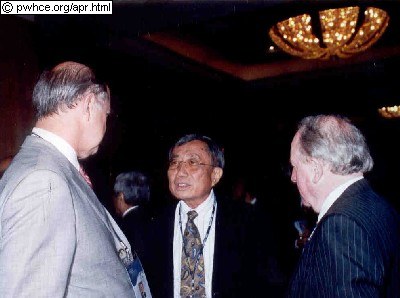 | |
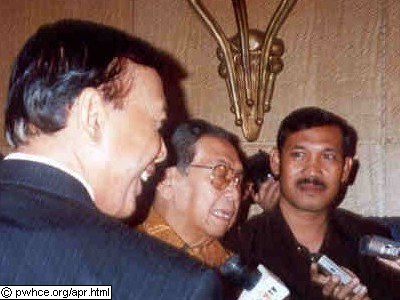 | 5. Presidential candidate former general Wiranto and then presidential candidate, Abdurrahman Wahid exchange pleasantries during media conference. | |
| The above photographs are ©2004 Asia Pacific Report and may not be used without permission, which can be obtained from Frank Mount, aspac1@hotkey.net.au | ||